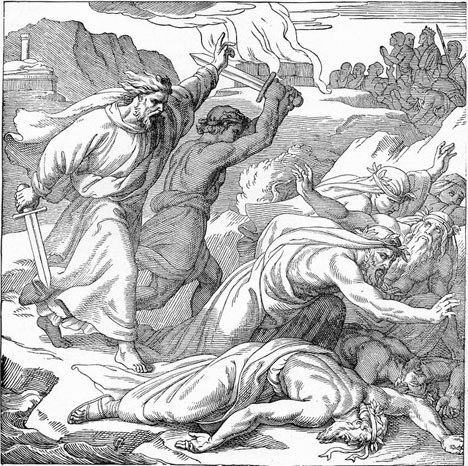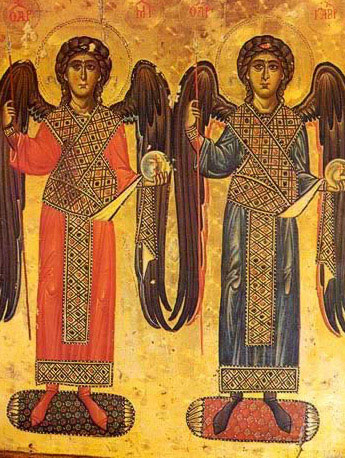May
18
2013
or A Ripsnorter Ritual
 Ritual is powerful stuff. Much of modern evangelicalism prides itself in rejecting liturgy and being “open to the Spirit,” and then turns this “openness” into an uninspired (and very uninspiring) human formula, in place of the inspired Divine one. Instead of following a pattern found in every part of the Bible (worship is literary architecture), we are stuck with either erroneous traditions or off-the-cuff rambles which, although “open to inspiration,” somehow sound exactly the same each week. Human beings love repetition in every area of life, and ritual is a prime method of teaching truth and holiness.
Ritual is powerful stuff. Much of modern evangelicalism prides itself in rejecting liturgy and being “open to the Spirit,” and then turns this “openness” into an uninspired (and very uninspiring) human formula, in place of the inspired Divine one. Instead of following a pattern found in every part of the Bible (worship is literary architecture), we are stuck with either erroneous traditions or off-the-cuff rambles which, although “open to inspiration,” somehow sound exactly the same each week. Human beings love repetition in every area of life, and ritual is a prime method of teaching truth and holiness.
Continue reading
5 comments | tags: Baptism, Liturgy, Peter Leithart, Revelation, Tabernacle, Temple | posted in Biblical Theology, Quotes
Mar
10
2013
 One of the reasons why moderns (including Christians) don’t really know what to do with the Mosaic Law is the failure to understand biblical history as a process of maturation. The prohibition of the second (kingly) tree in the Garden corresponds to the Food Laws, for instance. Like Israel’s temporary abstinence from meat (kingly food) in the wilderness, these laws were all for the purpose of humbling, for preparing servants to rule as God’s representatives. Once mature, they would be invited to eat with God as friends, rather than merely attending as servants.
One of the reasons why moderns (including Christians) don’t really know what to do with the Mosaic Law is the failure to understand biblical history as a process of maturation. The prohibition of the second (kingly) tree in the Garden corresponds to the Food Laws, for instance. Like Israel’s temporary abstinence from meat (kingly food) in the wilderness, these laws were all for the purpose of humbling, for preparing servants to rule as God’s representatives. Once mature, they would be invited to eat with God as friends, rather than merely attending as servants.
Continue reading
Comments Off | tags: Alastair Roberts, Deuteronomy, Exodus, James Jordan, Peter Leithart | posted in Biblical Theology
Feb
12
2013
 “With this theory of the joke in mind, the final chapter of Nehemiah is holy and hysterical.”
“With this theory of the joke in mind, the final chapter of Nehemiah is holy and hysterical.”
In his book, Deep Exegesis, Peter Leithart speaks of the biblical text as many things, but none is more confronting than his viewing the text as a “joke.” His explanation, however, makes perfect sense. What makes a joke funny? It is either prior knowledge to which not everyone is privy, or a confounding of expectations (which are also based on prior knowledge to some degree). The Bible is full of such jokes, and realizing one is in on the joke is immensely satisfying.
Continue reading
Comments Off | tags: Compromise, Ezra, Hermeneutics, Joke, Literary Structure, Nehemiah, Peter Leithart | posted in Bible Matrix, Biblical Theology, The Restoration Era
Jan
8
2013
 In Born of the Spirit, Peter J. Leithart writes:
In Born of the Spirit, Peter J. Leithart writes:
Alan Kerr (The Temple of Jesus’ Body: The Temple Theme in the Gospel of John (Library of New Testament Studies), 71) offers this comment on Jesus’ statement that Nicodemus had to be born of the Spirit before entering the kingdom: “It is almost universally accepted that Spirit here refers to the Spirit of God. But at this stage in the Gospel there was no Spirit (7:39), because Jesus was not yet glorified. It is not until Jesus is risen and appears to the disciples and breathes on them and says, ‘Receive the Holy Spirit’ that the Spirit is given (20:22). So from the point of view of Johannine timing what Jesus says to Nicodemus should only be realized in a post-resurrection setting. Properly speaking he can only be reborn from above when Jesus is glorified.”
This obviously affects the use of John 3:5 as a proof text for the doctrine of regeneration.
Is this support for the ‘giving of the Spirit’ in paedobaptism?
Continue reading
Comments Off | tags: Baptism, Elijah, John, John the Baptist, Noah, Peter Leithart | posted in Against Hyperpreterism, Biblical Theology, Creation
Dec
22
2012
or The Fiction of Prelapsarian Babies
“A paedobaptistic sociology is a misrepresentation of the Gospel. It conflates the cutting of Adam with the crushing of the serpent.”
The most biblical, thoughtful and consistent paedobaptists (the Federal Vision), believe that the failure of America’s baptistic culture can be remedied through a biblical application of paedobaptism. The answer to modern individualism is a coherent Christian sociology. I agree with that. What I disagree with is their insistence on a Covenant sociology that was made redundant at Pentecost.
Continue reading
4 comments | tags: Abraham, AD70, Baptism, Federal Vision, Peter Leithart | posted in Biblical Theology, The Last Days
Oct
10
2012
Comments Off | tags: Peter Leithart | posted in Biblical Theology
Aug
22
2012

And every pot in Jerusalem and Judah shall be holy to the Lord of hosts, so that all who sacrifice may come and take of them and boil the meat of the sacrifice in them. (Zechariah 14:21)
Working on a post about the use of seals in Revelation, I was looking through the uses of the word “seal” throughout the Bible. Daniel 9:24, a very famous verse, showed up, and its structure struck me as worth some analysis. If structure is indeed part of the means of the Author’s communication, it is not an optional extra.
Continue reading
Comments Off | tags: AD70, Covenant curse, Covenant Theology, Daniel, Feasts, James Jordan, Levites, Leviticus, Literary Structure, Peter Leithart | posted in Bible Matrix, Biblical Theology, The Last Days, The Restoration Era
Jul
21
2012
Red Blood, Blue Blood
 Behold, when we come to the land, you shall bind this line of scarlet thread in the window from which you let us down… Joshua 2:18
Behold, when we come to the land, you shall bind this line of scarlet thread in the window from which you let us down… Joshua 2:18
Each Israelite was to wear blue tassels on the four corners of his robe. The tassel was a blue cord that unraveled into threads, a “one” that became many. Using the “systematic typology” of the Bible Matrix, we can see that these four blue tassels correspond to the four rivers the flowed down from the spring under the Garden of Eden. [1]
So, what’s the deal with the “red cord” that Rahab was commanded to display in her window in Jericho? Firstly, the Hebrew word isn’t the same word as the “cord” in Numbers 15.
Continue reading
Comments Off | tags: Baptism, Circumcision, Grace, Joshua, Matthew, Peter Leithart, Rahab, Steven Opp, Systematic typology, Totus Christus, Worship as commerce | posted in Bible Matrix, Biblical Theology, Creation, Quotes
Jun
27
2012
or Music of the Spheres

Peter Leithart recently posted about ancient astronomy’s “lyre in the sky.”
According to ancient astronomy, the planets were in crystal spheres that formed a seven-stringed lyre in the sky. Moving from earth outward, the seven strings are: Moon, Mercury, Venus, Sun, Mars, Jupiter, Saturn. If you ascended from earth all the way up to the sphere of fixed stars, you’d pass through those seven spheres.
Continue reading
Comments Off | tags: James Jordan, Peter Leithart, Revelation | posted in Bible Matrix, Biblical Theology, Quotes
Jun
12
2012

or Getting a Handle on the Scandal
“We are on the right track as long as we have biblical horizons.”
Peter Leithart has been put through the ringer with accusations and trials for having some “Romish” doctrines. He’s posted some good defenses (links posted on here recently). Basically, Protestantism threw out some baby with the bathwater, and we need it back.
Now it turns out that the gent at the centre of the condemnation of Dr Leithart for going over to the dark side was himself a Sith Lord in training.
Continue reading
Comments Off | tags: Peter Leithart, Protestantism, Roman Catholicism | posted in Quotes
 Ritual is powerful stuff. Much of modern evangelicalism prides itself in rejecting liturgy and being “open to the Spirit,” and then turns this “openness” into an uninspired (and very uninspiring) human formula, in place of the inspired Divine one. Instead of following a pattern found in every part of the Bible (worship is literary architecture), we are stuck with either erroneous traditions or off-the-cuff rambles which, although “open to inspiration,” somehow sound exactly the same each week. Human beings love repetition in every area of life, and ritual is a prime method of teaching truth and holiness.
Ritual is powerful stuff. Much of modern evangelicalism prides itself in rejecting liturgy and being “open to the Spirit,” and then turns this “openness” into an uninspired (and very uninspiring) human formula, in place of the inspired Divine one. Instead of following a pattern found in every part of the Bible (worship is literary architecture), we are stuck with either erroneous traditions or off-the-cuff rambles which, although “open to inspiration,” somehow sound exactly the same each week. Human beings love repetition in every area of life, and ritual is a prime method of teaching truth and holiness.































